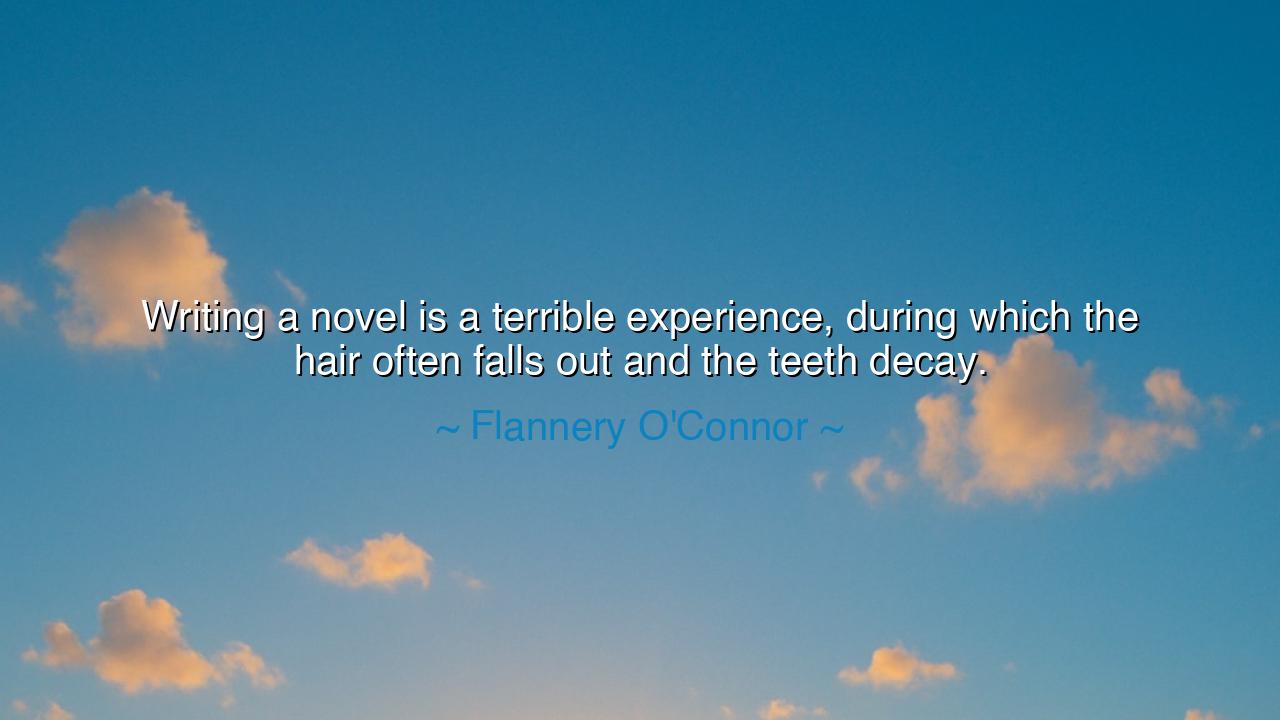
Writing a novel is a terrible experience, during which the hair
Writing a novel is a terrible experience, during which the hair often falls out and the teeth decay.






Host: The room was quiet, save for the soft rustling of pages as Jack turned them slowly, his attention clearly absorbed in the words of Flannery O'Connor that had just been shared. Outside, the sky had grown darker, the evening air now cool and still. Jeeny stood by the window, her arms loosely crossed, looking out at the street, her mind clearly processing the raw honesty in O'Connor’s words.
Jeeny: “I’ve been thinking about Flannery O'Connor's quote: ‘Writing a novel is a terrible experience, during which the hair often falls out and the teeth decay.’ It’s such a vivid, almost comedic way of describing the process of writing, isn’t it? But underneath the humor, there’s something really honest about it. Writing, especially something as long and involved as a novel, can be a deeply exhausting and even grueling experience.”
Jack: “Yes, exactly. It’s not all romanticized inspiration and creative flow. O'Connor is describing the reality of writing—a process that’s often filled with frustration, self-doubt, and the sheer grit of pushing through. It’s the side of writing that’s hidden behind the finished product, the sacrifices and struggles that come with bringing an idea into the world. The fact that writing can be physically taxing, even to the point of losing your hair or having your teeth decay, paints a picture of just how all-consuming it can be.”
Jeeny: “I think what’s so interesting about this is how O'Connor makes it clear that writing is not just about inspiration or creativity—it’s about persistence. It’s about pushing through the pain, the frustration, and even the fear of failure. She’s saying that the process itself can take a toll on you, and that’s okay. Writing a novel isn’t supposed to be easy. It’s a challenge that demands not just creativity, but endurance and mental strength.”
Host: The stillness in the room deepened, as the weight of O'Connor's words hung between them. Jack’s fingers stopped moving over the pages of the book, his thoughts now focused entirely on the reality of the writing process. Jeeny turned back toward him, her gaze thoughtful, as if reflecting on the deeper implications of what they had just discussed.
Jack: “It’s almost like O'Connor is saying that, despite the difficulty, the struggle is necessary. If it were easy, it wouldn’t feel as worthwhile. There’s a kind of authenticity in the exhaustion that comes from creating something meaningful. Writing a novel isn’t just about the end result—it’s about the journey, the process, and the perseverance that goes into it.”
Jeeny: “Yes. And I think there’s a certain beauty in that struggle, in the way O'Connor is acknowledging the pain of creation. It’s a reminder that art doesn’t come easily. The process can be grueling, frustrating, and exhausting. But that’s what makes it worth it when it’s finished. The work is what gives the art its depth, its soul. The sacrifice is part of what makes it meaningful.”
Jack: “So, in a way, O'Connor is giving us permission to embrace the hard parts of creativity. It’s not about avoiding difficulty or hoping for an easy path. It’s about accepting that creating something of value requires hard work—it’s going to take its toll, but that’s okay because in the end, it’s worth it.”
Jeeny: “Exactly. And it’s about being honest with ourselves about what the process really involves. Writing a novel—creating something from nothing—is never going to be easy, but it’s in that difficulty that we find the heart of the work. The struggle is part of the story, part of what makes the final product meaningful.”
Host: The room felt calmer, as if the conversation had settled into a quiet understanding. The reality of the creative process, as expressed by Flannery O'Connor, had shifted something between them. The idea that writing, or any form of creation, isn’t about avoiding pain or difficulty, but about embracing it as part of the journey, had become a shared realization. It wasn’t about the finished product; it was about the struggle, the persistence, and the willingness to push through the challenges to create something meaningful. The world outside had grown quiet, but inside, there was a clarity—a reminder that creativity is not just about inspiration, but about resilience and dedication.






AAdministratorAdministrator
Welcome, honored guests. Please leave a comment, we will respond soon